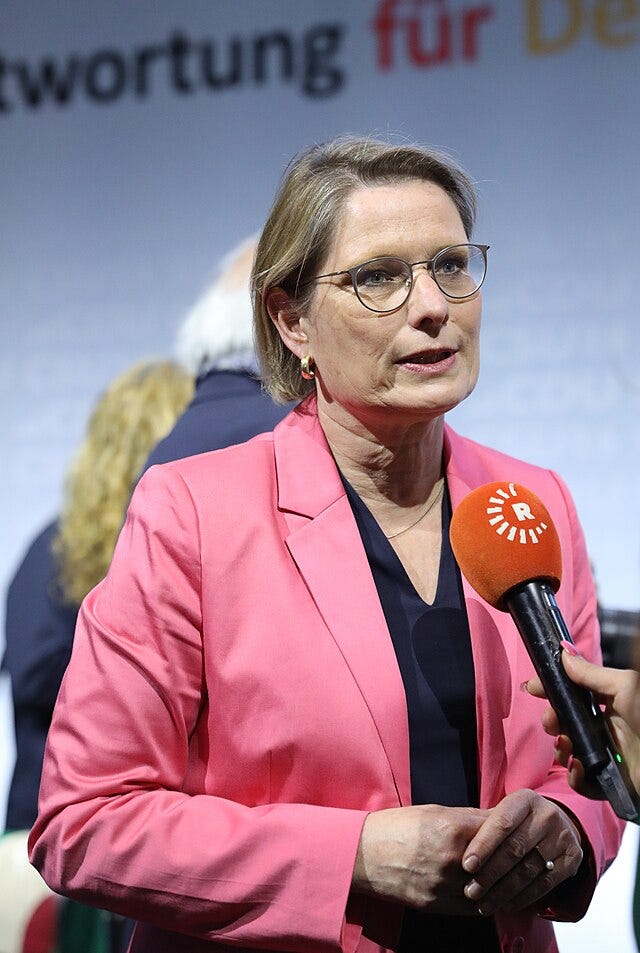News Round-Up: Trump Fallout with Musk, Expensive Wind Energy, and German Minister Weighs Banning Opposition Party
Every week, the editorial team of Freedom Research compiles a round-up of news that caught our eye, or what felt like under-reported aspects of news deserving more attention.
Over the past week, the following topics attracted our attention:
Musk says Trump is on Epstein list.
Wind energy more expensive, less secure – Swedish report.
German justice minister weighs banning the biggest opposition party.
UK Net Zero plans: 200 job losses per week in the energy sector.
Greece: 10 defendants found guilty over deadly fire near Athens in 2018.
Musk says Trump is on Epstein list
Billionaire entrepreneur and now evidently and ex-ally of the US President Donald Trump, Elon Musk, alleged that Trump has ties to convicted sex offender and financier Jeffrey Epstein as the part of his feud with the president, The Hill reports.
“Time to drop the really big bomb,” Musk wrote on X. “@realDonaldTrump is in the Epstein files. That is the real reason they have not been made public.” Minutes later, he followed up: “Mark this post for the future. The truth will come out.”
Musk deleted the post some time later.
Names of powerful people previously associated with Epstein — who died in his jail cell in 2019 – including Trump, Prince Andrew, and former President Clinton, have been mentioned in court documents related to Epstein’s decades of sexual abuse.
Trump, before he was elected in November, said he would have “no problem” releasing files related to Epstein, something some lawmakers and many on social media have called for after Epstein’s death.
Last year the president denied any connection to Epstein, writing on social media, “I was never on Epstein’s Plane, or at his ‘stupid’ Island. Strong Laws ought to be developed against A.I. It will be a big and very dangerous problem in the future!”
In a statement on Thursday evening, White House Press Secretary Karoline Leavitt called Thursday’s spat “an unfortunate episode from Elon, who is unhappy with the One Big Beautiful Bill because it does not include the policies he wanted.”
“The President is focused on passing this historic piece of legislation and making our country great again,” Leavitt added.
The feud will most probably prove to be very expensive for Musk. On Friday, Trump said he would look into canceling the loans and subsidies for Musk's companies, telling reporters: 'I would certainly think about it, but it has to be fair.'
The fallout between Musk and Trump is related to legislation increasing US government debt which Musk opposes. While leading the department of government efficiency team, his efforts were aimed at reducing government spending. Musk left his position as the head of DOGE last week.
In addition, reports have emerged about a physical incident between Musk and Treasury Secretary Scott Bessent in the White House in mid-April. Musk aggressively body-checked Bessent, the report claims. The heated scuffle broke out after both men pitched rival plans for the Internal Revenue Service to Trump in the Oval Office, with the president ultimately backing Bessent’s choice, the Washington Post quoted former White House official Steven Bannon as saying. The pair left the meeting hurling insults at each other within earshot of the president’s office, Bannon told the outlet.
Wind energy more expensive, less secure – Swedish report
A new study by Swedish think-tank the Scandinavian Policy Institute (SPI) has warned that the promotion of wind power as being cost-effective and reliable is misleading at best, Brussels Signal reports.
Sweden has strongly developed solar and wind power production capacity, yet at the same time, the SPI researchers found that electricity prices had become more volatile.
Making matters more pressing, future electricity demand is bound to go up – in part mandated by the so-called “green” transition.
Onshore wind power has been promoted as the best option by many politicians who claim it would increase grid power generation without jeopardising it. The scientists who wrote the SPI report said the reality was different. They noted that the functioning of the Swedish electricity system could not be guaranteed if the share of weather-dependent power generation increased sharply from what they already considered to be a high level.

“The energy system is the bloodstream of society. It deserves to be treated with respect, long-term thinking, and precision,” said one of the authors, Magnus Henrekson, Professor of Economics and Senior Research Fellow at the Research Institute of Industrial Economics (IFN).
“In order to avoid future crises, we must be clear about its real functioning and its real costs. It is time to put the national economy and system stability back at the centre of Swedish energy policy.”
The other contributors to the report were Per Fahlén, Magnus Henrekson and Mats Nilsson – all highly respected professors in the fields of energy and economy.
German justice minister weighs banning the biggest opposition party
German Federal Justice Minister Stefanie Hubig, of the Social Democrats (SPD), is keeping the hope for a ban on the Alternative for Germany (AfD) alive, saying a ban should still be on the table, Remix News reports.
As she told the German newspaper Rheinische Post, a ban should not be “dismissed for political reasons alone.” She also brushed away concerns that the AfD could “once again portray itself as a victim” if ban proceedings are initiated.

Most of the main German parties have advocated for an AfD ban, including many top politicians from the SPD. However, a vote must first pass in the German parliament, the Bundestag, and be then approved by the Bundesrat, which is represented by the 16 German states. From there, it would need to go to the top German court, the Constitutional Court, which could still reject such a ban as unconstitutional – a risk many opposed to a ban have cited for not moving forward with such a proposal.
Hubig acknowledges that the legal hurdles remain high. A ban of the largest opposition party in the country, and one that has reached first place in some polls, would potentially end German democracy. But this is not deterring many from the German political establishment.
Hubig said that it must be examined whether the AfD “is systematically and actively opposing the free democratic order and whether this can be proven.” She said that once such proof is established, the government is obligated to take action.
UK Net Zero plans: 200 job losses per week in the energy sector
According to a new study by researchers at the UK Robert Gordon University (RGU), tens of thousands of British jobs are at risk by the end of this decade because of the Net Zero push. More precisely, the offshore wind energy sector will only be able to create 29,000 jobs by 2030, while around 58,000 jobs will be lost in the oil and gas sector during the same period. This is equivalent to 200 job losses per week over the next five years, writes The Telegraph.
The current goal is to achieve 43-50 gigawatts (GW) of offshore wind energy production capacity by 2030. The goal is to ensure both energy security and stable employment for the North Sea workers. However, based on current industry developments, new jobs are not being created fast enough to compensate for the decline in the number of workers in the oil and gas industry.
The RGU considers that the target as a whole is rather unrealistic, especially in such a short time frame as five years. It is suggested that one way to avoid significant job losses is to either attract a larger share of turbine manufacturing to the UK or reverse the ban on new North Sea drilling licences to temporarily boost oil and gas production.
Greece: 10 defendants found guilty over deadly fire near Athens in 2018
A Greek court has found 10 people guilty of negligence over a devastating fire that killed more than 100 people near Athens in 2018, Euronews reports. A total of 21 defendants were accused in connection with the fatal blaze that struck the town of Mati, northeast of the capital Athens, after starting in a resident's garden. The defendants included eight former senior fire brigade officials, a former general secretary for civil protection, and the man responsible for starting the fire. They were found guilty of charges including manslaughter by negligence. Six of the defendants had been found guilty in an earlier ruling and had appealed the decision, which had handed down sentences of up to five years of imprisonment, punishments that were later commuted into fines. Konstantinos Angelopoulos, the resident in whose yard the fire started, was unanimously found guilty of arson.

What happened is a tragic reminder that despite political leaders often attributing wildfires to climate change, human negligence and poor decisions by officials in response to these events are the underlying cause.



